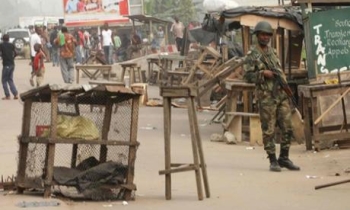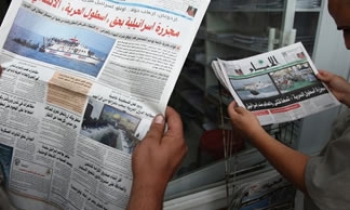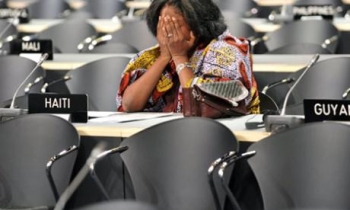In March 2004, WorldNetDaily reported on Bangladeshi journalist Salah Uddin Shoaib Choudhury and my efforts to free him. Choudhury, a Muslim, was accused of spying for Israel after his 2003 articles warned Bangladeshis about the rise of Islamists there, urged his country to recognize Israel, and advocated religious equality and mutual respect. Then, as he was about to board a plane for Bangkok on his way to Tel Aviv to give an address on the role of the media in creating peace, police grabbed him and secreted him away.
They held him overnight in a dark and stifling cell. Hours later, they brought him "a crust of bread and water from the toilet tap." Though it sickened him, he said, he was so hungry that he ate and drank. Dragged in and out of court, then remanded for further "interrogation," he was eventually charged with sedition, a capital offense and a charge that still hangs over him.
For 17 months, I led a campaign – often alone – to free my "brother." While I did, officials were merciless. We now know that Shoaib was subject to all sorts of mistreatment and torture. He was beaten, his bones broken, and he was forced to sit in an unventilated cell throughout Bangladesh's oppressively hot summer. He was denied any medical care and came close to losing his eyesight. On the outside, his family was ostracized and pressured to denounce him – pressure they resisted. His brother was physically attacked and twice had to flee the capital for a safe house. When he asked the police for help, they refused, blaming the Choudhurys for their "alliance with the Jews." Eventually, with the help of Rep. Mark Kirk, R-Ill., we forced his release; but subsequent events have qualified that victory – qualifications steeped in Islamist efforts to re-create the former Afghan Taliban state in Bangladesh.
Two weeks after the WND piece, Kirk summoned Bangladesh Ambassador Shamsher M. Chowdhury to his office for a meeting with the two of us regarding Shoaib. After numerous equivocations and factually incorrect assertions, Chowdhury admitted that the charge had no basis and agreed to Shoaib's release on bail.
"Not good enough," I said. Kirk, too, insisted that maintaining these false charges was a serious human-rights violation. Chowdhury (and subsequently several high Bangladeshi officials) promised Kirk and me that the charges would be dropped. Fourteen months later, they remain.
After his release, Shoaib began publishing again. He ignored his ordeal and continued to write about the same topics that previously ran him afoul of Bangladeshi Islamists and their fellow travelers. His was (an still is) the only Bangladeshi paper with unbiased news about Israel and which continues to warn Bangladeshis that the Islamists who have since carried out suicide bombings in the country are preparing to grab power. He continues to receive death threats. While not shutting him down for fear of jeopardizing its relationship with – and foreign aid from – the United States, the government has kept advertisers from patronizing Choudhury. In March, it prevented me from entering the country to see him; and in May, it "advised" him not to come to the U.S. to receive an award. If all of this was only directed at Shoaib, it still would be a tragedy; but the rationale and implications go much further.
As reported in an article I recently wrote for Joseph Farah's G2 Bulletin, the Indian Intelligence Service has confirmed that al-Qaida terrorists kicked out of their lairs in Afghanistan and Pakistan have moved into Nepal, a country with a tiny Muslim population, but one that almost touches the world's third-largest Muslim nation: Bangladesh. G2 further told of an unholy alliance between Nepalese communists – who have been waging a war to take over that country – and South Asian Islamists who covet the Muslim populations of South Asia, who represent more than one out of every four Muslims in the world. Bangladesh alone has about one of every 10 Muslims worldwide. There the ruling coalition already includes several Islamist parties that are poised for an even stronger electoral showing in January.
At the very least, Islamists have become Bangladesh's power brokers and can determine whether the center-right Bangladesh National Party, or BNP, retains power, or whether their hated rivals, the leftist Awami League will take over. As a result, the AL excoriates the BNP and maintains a hands-off policy toward the Islamists. The BNP, for its part, is guilty of continually appeasing them. And Salah Uddin Shoaib Choudhury has been one of that policy of appeasement's regular casualties. Several high government officials have admitted privately that although the charges against him are false, they are afraid to simply drop them, as one of them told me, "for fear of how the radicals [Islamists] will react."
The press, much of it financed and controlled by Islamist monies from abroad, has labeled Shoaib a Zionist agent; various Islamists among the police also have bandied about that label. Another government official admitted that dropping the charges against Shoaib would likely cost them votes and perhaps enough to swing the election against them. During Shoaib's May court appearance, the Islamist judge berated the government for not pursuing him aggressively enough!
Thus, while the Bangladeshis rightly tout their success in arresting several terrorist leaders, they continue to support the ideological infrastructure the Islamists have built throughout their society. And to further strengthen their electoral chances in January, it would be quite simple for the Islamists to smuggle "voters" across the lightly guarded frontier near their bases in Nepal.
The government continues to find excuses for postponing Shoaib's trial – still unable after two and a half years to gather enough evidence to begin its prosecution – and the next trial date is not until mid-July. Should there be another delay then, it will have become clear that the government has decided to stop trying to sail between the Scylla of Islamist anger and U.S. alienation. It likely will continue with its delaying tactics so that the matter is left with the caretaker government that assumes power in October. And if it does not either try Shoaib or drop the charges, the government that wins in January will not have to worry about the voters for another five years. Shoaib is praying that it is not the Islamists who emerge victorious.









